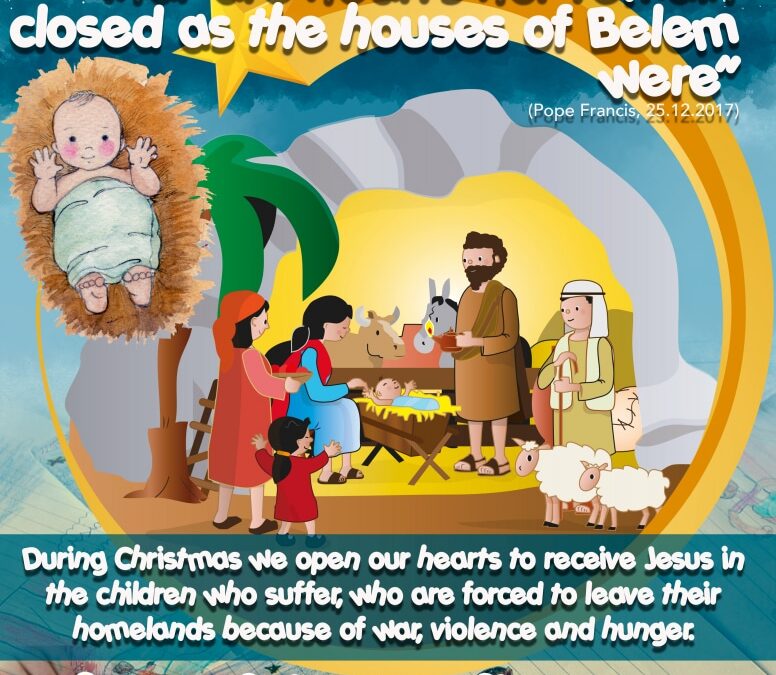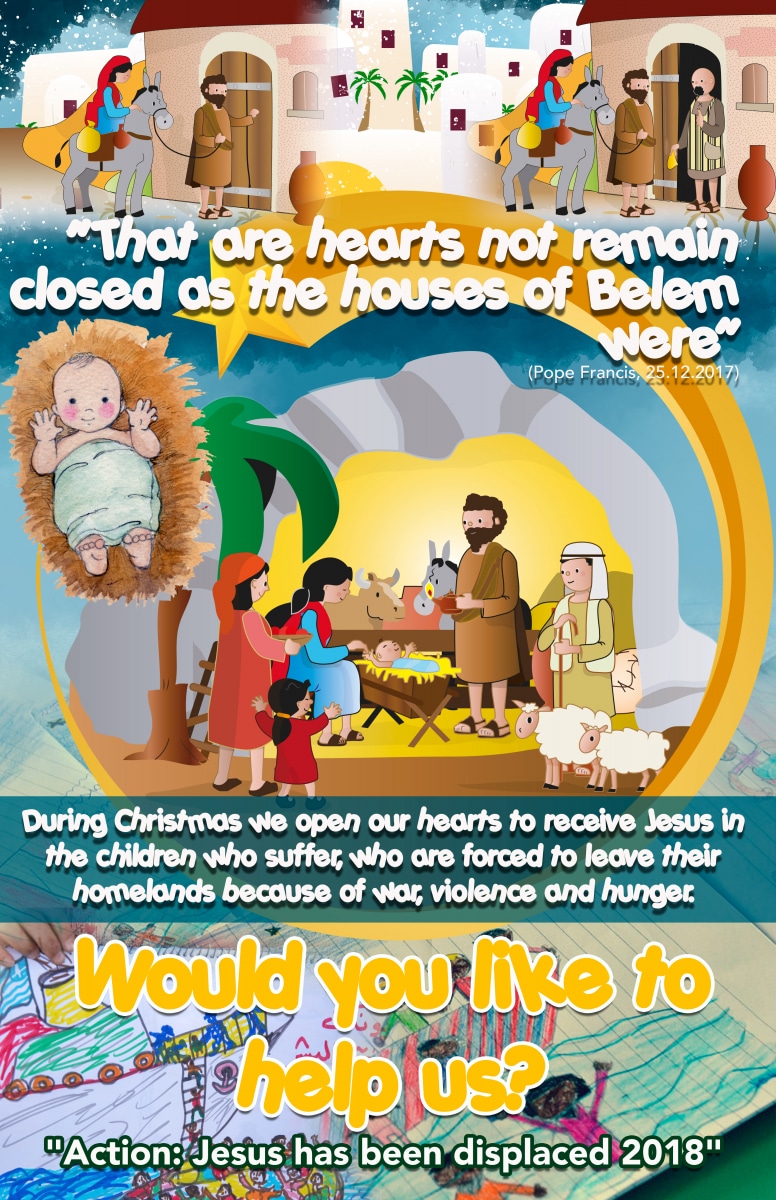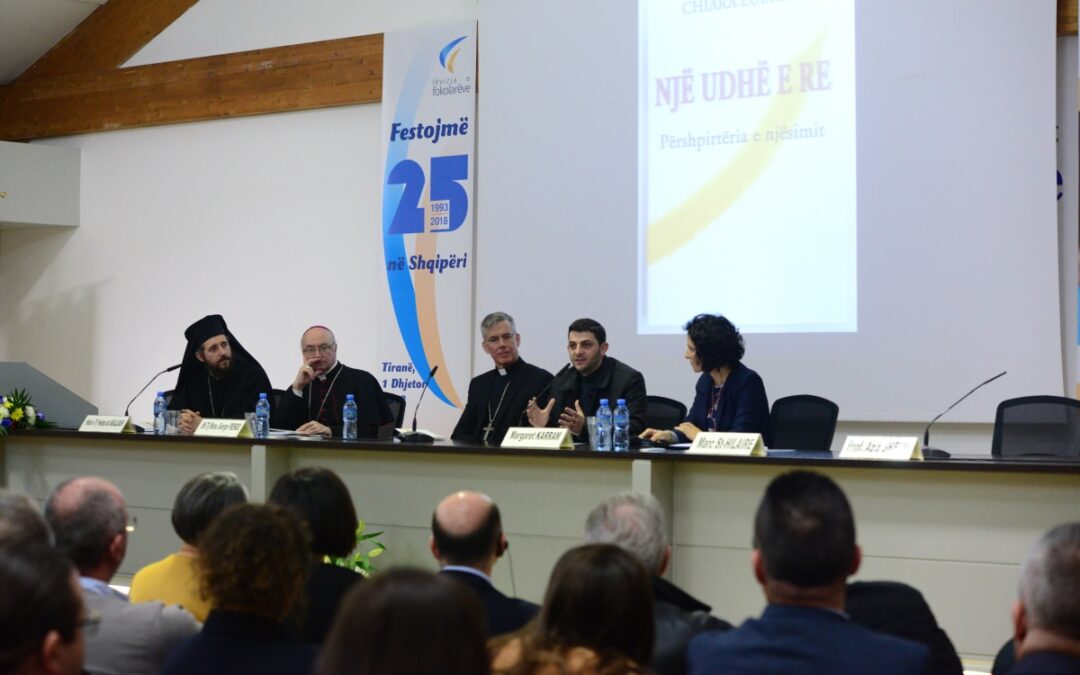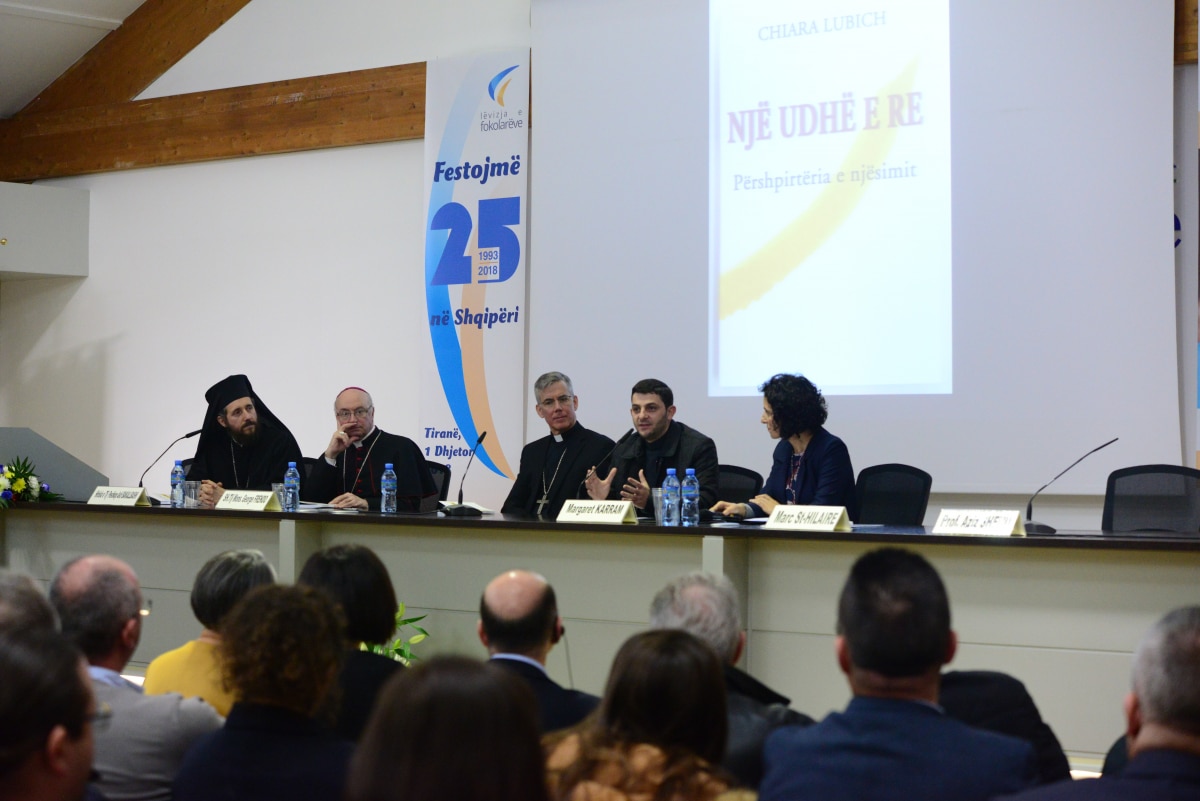
29 Dec 2018 | Non categorizzato
This year too as Christmas approaches there is a lot of buzz among the children of the Focolare Movement who are serious in sharing to others the invitation to welcome Jesus in those who are suffering
 Pope Francis, during the Christmas of 2017, invited us to see to it that: «Our heart is not closed like the houses of Bethlehem were»1. Taking this invitation of the Pope seriously, with the support of their assistants, the involvement of their parents, teachers, classmates, their activity called «Jesus is left out!» (Hanno sloggiato Gesù) (HSG) is directing itself towards supporting projects of hospitality to help those who are marginalized or who suffer due to wars, injustices, those who are homeless or are forced to leave their homeland.
Pope Francis, during the Christmas of 2017, invited us to see to it that: «Our heart is not closed like the houses of Bethlehem were»1. Taking this invitation of the Pope seriously, with the support of their assistants, the involvement of their parents, teachers, classmates, their activity called «Jesus is left out!» (Hanno sloggiato Gesù) (HSG) is directing itself towards supporting projects of hospitality to help those who are marginalized or who suffer due to wars, injustices, those who are homeless or are forced to leave their homeland.
In this unique «framework» of hospitality, they have set-up small workshops to make little statues of Baby Jesus to offer in the streets, the town or city squares, in the most varied places so as to share with everyone that the real meaning of Christmas is Jesus who is born for everyone, today like yesterday, and that He is waiting for us to welcome Him in all those who are in need. The action of “HSG” conducted by the littlest ones, brings with it the profound values of Christmas: giving oneself, gratitude, unconditional love, generosity. This indirectly also reinforces these values in adults and in families. The production of the little statues promotes manual, creative and immaginative skills, collaboration, planning and self-expression. It develops in the children a sense of active citizenship, solidarity, fraternity, also through the fund-raising activities that provide concrete answers to the needs of children in different parts of the world. It stimulates the desire to give. Many people in fact, spontaneously leave a donation to support these initiatives. Experiences have been shared by adults who have received the message from the little ones on how, with love, they would like to find a home for Jesus at least this Christmas. «It is really life-changing to enter a supermarket and be welcomed by these children who smilingly offer you Baby Jesus», exclaimed a gentleman from Florence. «We think we can find everything in a supermarket but I never imagined that I would go home bringing Jesus with me!».
prepared by Rosi Bertolasso
28 Dec 2018 | Non categorizzato
A quarterly journal for those who work at all levels in the ecclesial ambit. The subheading “Pathways of Communion and Dialogue” describes the type of content that characterises it. Born in synergy between the Focolare Movement and the Città Nuova Publishing Group, this journal, in both printed and digital form, released its first issue in Italian, but articles in English are also foreseen. Other language editions are expected to be published in the near future. It is presented as an instrument of formation, as an aid for action and as a source of inspiration in the search for new ways and expressions to share the Gospel with the men and women of our time. It is aimed at pastoral workers and animators, members of religious organisations (consecrated persons and laity), people involved in parishes or dioceses, people belonging to ecclesial movements or associations, but it will also dedicate space to the relationship between different Churches and world religions, to the encounter between different beliefs and cultures, to the renewal of Church and society. Each issue will focus on a particular theme. “The Greek word ekklesía means ‘assembly’, people who know they are summoned and called together to be protagonists in the journey of a people,” reads the editorial of the first issue. “The subheading pathways refers to the experimental and in-depth nature of the publication; communion and dialogue defines the direction in which it is heading but also its style. We hope that the journal, in both printed and digital form, and in all its subsequent language editions, may express and be of service to the community.” The authors include: Piero Coda (theologian), Vincenzo Zani (Secretary of the Congregation for Catholic Education), Tiziana Longhitano SFP, Cardinal Giuseppe Petrocchi (Archbishop of Aquila), Gerard Rossé (exegete), Brendan Leahy (Bishop of Limerick, Ireland), Jesús Morán (Co-President of the Focolare Movement), Fabio Ciardi OMI (expert on consecrated life), Susana Nuin (communications expert from Columbia), Callan Slipper (Anglican theologian) and Stefan Tobler Evangelical theologian. More details and journal subscription: www.cittanuova.it Email: ekklesia(at)cittanuova.it / abbonamenti(at)cittanuova.it

27 Dec 2018 | Non categorizzato
Twenty-five years of the Focolare in Albania “We, who have followed the developments of the Focolare Movement in the world and in Albania, have noted the Focolare’s concrete response to our need for unity.” Words pronounced by Donika Omari, an Albanian journalist and translator without any religious convictions, on the occasion of the 25th anniversary of the arrival of the spirituality of unity in the ‘Land of Eagles’. Albania still suffers from social, regional, ideological and religious divisions. A country made up of Muslims, with the presence of the Sufi religious brotherhood of Bektashi; Christians, mostly Catholic and Orthodox; and many people who do not recognize themselves in any religious belief. “Chiara Lubich’s message of unity overcoming divisions of all kinds among people – continues Donika Omari – has been healthy for our land.”  In 1991, the first focolarino, Gigi Franco arrived in Durazzo and was welcomed by a family. Then, the second focolarino arrived and the male Focolare centre was opened in Tirana, followed some years later by the female one. Since then a community has been forming, which includes today Christians, Muslims and people without a religious belief. “The spirit of ‘becoming one with the neighbour’, the brotherhood among people without distinction of social category, race, nationality, ideology – explains Donika Omari – are messages that have attracted me to this Movement from the beginning. We feel this need for our country where old and new upheavals have hindered the normalization of human relations.” The country has experienced very painful moments, such as the 1999 war in Kosovo, but the Focolare Movement all over the world helped us. They helped to raise funds, take in over 500,000 refugees, and also helped out in reconstructing the country after the war. On the occasion of the 25th anniversary of the Focolare in Tirana, a public event was held in the Great Hall of the Catholic University “Our Lady of Good Counsel” where Chiara Lubich’s book in Albanian, “Una via nuova”, was presented. There were about two hundred participants, with representatives from Kosovo and Macedonia. Among them was the Apostolic Nuncio, Msgr. Charles Brown, the Catholic Archbishop, Msgr. Frendo, the Cathedral of Tirana’s Orthodox Bishop, Asti Bakallbashi, and a Muslim Pedagogy professor from the University of Skopje, Prof. Shehu. “This anniversary is a sign of continuity and development. It gave me the joy to see that despite the invasion of consumerism and the anxiety for a precarious future, leading many to think of expatriation, the family and social values of Albanian society are still intact even among the youth,” says Livio Brianza, who has lived in the Focolare of Tirana for twelve years. The Focolare Movement’s President, Maria Voce, sent a message to the Albanian Focolare community in which she expressed: “nourished and strengthened by continuous mutual love and by an ever more intense presence of the Love of loves among you, may you contribute in making your cities ‘shine like gold’ with increased commitment.” “Twenty-five years ago I wanted to change the world – says Madi Roço, an Albanian and a legal expert in environmental legislation – I was very confident that I would see the world united with my own eyes. I still have the same dream, loud and clear. Seeing the Focolare ‘family’ grow and join me, has ‘armed’ me with the courage to move forward.”
In 1991, the first focolarino, Gigi Franco arrived in Durazzo and was welcomed by a family. Then, the second focolarino arrived and the male Focolare centre was opened in Tirana, followed some years later by the female one. Since then a community has been forming, which includes today Christians, Muslims and people without a religious belief. “The spirit of ‘becoming one with the neighbour’, the brotherhood among people without distinction of social category, race, nationality, ideology – explains Donika Omari – are messages that have attracted me to this Movement from the beginning. We feel this need for our country where old and new upheavals have hindered the normalization of human relations.” The country has experienced very painful moments, such as the 1999 war in Kosovo, but the Focolare Movement all over the world helped us. They helped to raise funds, take in over 500,000 refugees, and also helped out in reconstructing the country after the war. On the occasion of the 25th anniversary of the Focolare in Tirana, a public event was held in the Great Hall of the Catholic University “Our Lady of Good Counsel” where Chiara Lubich’s book in Albanian, “Una via nuova”, was presented. There were about two hundred participants, with representatives from Kosovo and Macedonia. Among them was the Apostolic Nuncio, Msgr. Charles Brown, the Catholic Archbishop, Msgr. Frendo, the Cathedral of Tirana’s Orthodox Bishop, Asti Bakallbashi, and a Muslim Pedagogy professor from the University of Skopje, Prof. Shehu. “This anniversary is a sign of continuity and development. It gave me the joy to see that despite the invasion of consumerism and the anxiety for a precarious future, leading many to think of expatriation, the family and social values of Albanian society are still intact even among the youth,” says Livio Brianza, who has lived in the Focolare of Tirana for twelve years. The Focolare Movement’s President, Maria Voce, sent a message to the Albanian Focolare community in which she expressed: “nourished and strengthened by continuous mutual love and by an ever more intense presence of the Love of loves among you, may you contribute in making your cities ‘shine like gold’ with increased commitment.” “Twenty-five years ago I wanted to change the world – says Madi Roço, an Albanian and a legal expert in environmental legislation – I was very confident that I would see the world united with my own eyes. I still have the same dream, loud and clear. Seeing the Focolare ‘family’ grow and join me, has ‘armed’ me with the courage to move forward.”
Cristina Tomelleri
21 Dec 2018 | Non categorizzato
Christmas greetings from Maria Voce, President of the Focolare Movement. https://vimeo.com/307656906 It’s Christmas! If I look around me, in towns and cities but also in the media, I often ask myself, “What is Christmas really about?” It is as though there is a din all around me, because it seems to be made up of dinners, gifts, decorations, lights and street markets. And all this din seems to be trying to hide – without succeeding – the cry of pain and suffering on the part of so many people in the world who are calling out for solidarity, respect, welcome, peace and justice. They are really appealing for love. And human beings don’t know how to give them love, but God does. God knows how to give love and he does so. The little Child we see in the crib this Christmas, as in all the other Christmases, tells of God’s love. God so loved humankind as to become one of us, becoming small and defenceless, facing all kinds of sufferings, not only facing them but actually experiencing them, all the sufferings of humankind and death itself. Coming to live among people on earth was God’s way of saying “yes” to humankind once more, to reunite them again with him. God’s ‘yes’ to humankind is represented by that little Child in Bethlehem, by that baby whose name people don’t even want to hear mentioned any more. I visited a country where in order to keep the festive atmosphere of Christmas without referring to God, people invented a “Winter Festival” to be able to celebrate. Yet even so, God loves each person and continues to love everyone, telling us so once more. This Child not only shows us God’s love but shares this love with us. He gives us love, helping us to live it and teaching us what to do. He then wants us to do the same, to be witnesses of God’s love to other people, giving God’s love to others, a love like his. God’s love does not have preferences. It is a love that reaches everyone, that does not put up barriers; it is not prejudiced and does not discriminate between people. This love can open our hearts, our hands, our arms, our wallets and our homes. If this kind of love is alive among people, then God himself lives among them. Only God can make everyone feel at home, creating a family among everyone, all brothers and sisters, a real celebration. Christmas is like this. If we live in this way, it is a real Christmas for us. This is the Christmas I wish for all of you. Happy Christmas!
20 Dec 2018 | Non categorizzato
An award for the body of people that perseveres in promoting initiatives that create fraternity in their area and translates this universal value into civic and political commitment. Nominations for the annual “Chiara Lubich International Award for fraternity” should be made by Jan 15 2019. This award is open to local authorities (provincial, regional or rural communities) from any part of the world, be they large or small organisations. Awards are made to projects that initiate or spread activities promoting universal fraternity usually at the local level. However, projects may also be on a national or international scale. They should reflect an understanding of the meaning of universal fraternity and encourage citizens to show commitment in working for the common good and to play an active role in the community. The projects should facilitate the growth of a culture of active and inclusive citizenship. They should also favour collaboration and synergy among areas of administration, local communities and civil society such as associations, groups and committees and they should make an impact upon these areas. The projects should be typical of a sustained way of working in that area favouring fraternity and should not be “one-off” actions. Presentations of the projects can take the form of text or text with links to audio-visual material. Nominations and supporting material should be sent to Presidenza dell’Associazione “Città per la Fraternità”, c/o Comune di Castel Gandolfo, Piazza Libertà, 7 – 00040 Castel Gandolfo – Rome (Italy). Alternatively, if electronic transfer is possible, they can be sent to associazionecittafraernita(at)gmail.com o info(at)cittaperlafraternita.org The nominations should include the following details: the name of the authority or organisation, the leader’s personal details, the full address and contact details, the name of the project or initiative and an abstract (maximum three sides of A4) that describes the project and how it functions. The award giving will take place in S. Maria Capua Vetere- Caserta (Italy) in February 2019. For further information: Associazione “Città per la Fraternità”, telephone +39 340 4182127 – +39 347 4573988; e-mail: associazionecittafraternita(at)gmail.com – info(at)cittaperlafraternita.org.

 Pope Francis, during the Christmas of 2017, invited us to see to it that: «Our heart is not closed like the houses of Bethlehem were»1. Taking this invitation of the Pope seriously, with the support of their assistants, the involvement of their parents, teachers, classmates, their activity called «Jesus is left out!» (Hanno sloggiato Gesù) (HSG) is directing itself towards supporting projects of hospitality to help those who are marginalized or who suffer due to wars, injustices, those who are homeless or are forced to leave their homeland.
Pope Francis, during the Christmas of 2017, invited us to see to it that: «Our heart is not closed like the houses of Bethlehem were»1. Taking this invitation of the Pope seriously, with the support of their assistants, the involvement of their parents, teachers, classmates, their activity called «Jesus is left out!» (Hanno sloggiato Gesù) (HSG) is directing itself towards supporting projects of hospitality to help those who are marginalized or who suffer due to wars, injustices, those who are homeless or are forced to leave their homeland.

 In 1991, the first focolarino, Gigi Franco arrived in Durazzo and was welcomed by a family. Then, the second focolarino arrived and the male Focolare centre was opened in Tirana, followed some years later by the female one. Since then a community has been forming, which includes today Christians, Muslims and people without a religious belief. “The spirit of ‘becoming one with the neighbour’, the brotherhood among people without distinction of social category, race, nationality, ideology – explains Donika Omari – are messages that have attracted me to this Movement from the beginning. We feel this need for our country where old and new upheavals have hindered the normalization of human relations.” The country has experienced very painful moments, such as the 1999 war in Kosovo, but the Focolare Movement all over the world helped us. They helped to raise funds, take in over 500,000 refugees, and also helped out in reconstructing the country after the war. On the occasion of the 25th anniversary of the Focolare in Tirana, a public event was held in the Great Hall of the Catholic University “Our Lady of Good Counsel” where Chiara Lubich’s book in Albanian, “Una via nuova”, was presented. There were about two hundred participants, with representatives from Kosovo and Macedonia. Among them was the Apostolic Nuncio, Msgr. Charles Brown, the Catholic Archbishop, Msgr. Frendo, the Cathedral of Tirana’s Orthodox Bishop, Asti Bakallbashi, and a Muslim Pedagogy professor from the University of Skopje, Prof. Shehu. “This anniversary is a sign of continuity and development. It gave me the joy to see that despite the invasion of consumerism and the anxiety for a precarious future, leading many to think of expatriation, the family and social values of Albanian society are still intact even among the youth,” says Livio Brianza, who has lived in the Focolare of Tirana for twelve years. The Focolare Movement’s President,
In 1991, the first focolarino, Gigi Franco arrived in Durazzo and was welcomed by a family. Then, the second focolarino arrived and the male Focolare centre was opened in Tirana, followed some years later by the female one. Since then a community has been forming, which includes today Christians, Muslims and people without a religious belief. “The spirit of ‘becoming one with the neighbour’, the brotherhood among people without distinction of social category, race, nationality, ideology – explains Donika Omari – are messages that have attracted me to this Movement from the beginning. We feel this need for our country where old and new upheavals have hindered the normalization of human relations.” The country has experienced very painful moments, such as the 1999 war in Kosovo, but the Focolare Movement all over the world helped us. They helped to raise funds, take in over 500,000 refugees, and also helped out in reconstructing the country after the war. On the occasion of the 25th anniversary of the Focolare in Tirana, a public event was held in the Great Hall of the Catholic University “Our Lady of Good Counsel” where Chiara Lubich’s book in Albanian, “Una via nuova”, was presented. There were about two hundred participants, with representatives from Kosovo and Macedonia. Among them was the Apostolic Nuncio, Msgr. Charles Brown, the Catholic Archbishop, Msgr. Frendo, the Cathedral of Tirana’s Orthodox Bishop, Asti Bakallbashi, and a Muslim Pedagogy professor from the University of Skopje, Prof. Shehu. “This anniversary is a sign of continuity and development. It gave me the joy to see that despite the invasion of consumerism and the anxiety for a precarious future, leading many to think of expatriation, the family and social values of Albanian society are still intact even among the youth,” says Livio Brianza, who has lived in the Focolare of Tirana for twelve years. The Focolare Movement’s President,